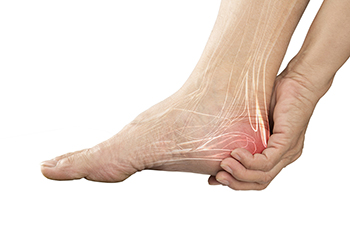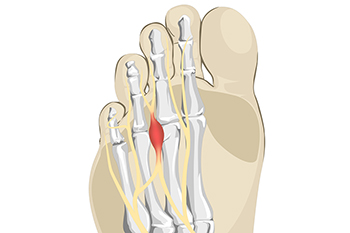Items filtered by date: February 2023
Swollen Feet Can Be Related to Back Pain

Sometimes, an individual’s feet may swell up in size and become filled with extra bodily fluids. There are many different reasons why an individual might experience increased foot swelling. For example, when an individual is pregnant, they may have foot swelling. Sometimes, certain things that cause swollen feet can also result in lower back pain. Importantly, the two are not always linked, but sometimes can be. Pregnancy is one such condition that can cause both lower back pain and foot swelling. It is well-known that pregnancy is associated with swollen feet due to increased fluid accumulation. Additionally, due to the extra strain linked with carrying a baby to term, pregnancy can also cause pain in the lower back area. Pregnancy, of course, is not the only thing on the list that can cause both feet swelling and lower back pain. In addition to pregnancy, arthritis, piriformis syndrome, and infection can also cause these two symptoms through inflammation. It is suggested that you contact a podiatrist for more information about the link between swollen feet and back pain.
Swollen feet can be a sign of an underlying condition. If you have any concerns, contact one of our podiatrists of Podiatry Associates of Victoria. Our doctors can provide the care you need to keep you pain-free and on your feet.
Swollen feet are a common ailment among pregnant women and people who stand or sit for extended periods. Aging may increase the possibility of swollen feet and patients who are obese often notice when their feet are swelling too. There may be medical reasons why swollen feet occur:
- Phlebitis - A condition that causes the veins to become inflamed and can also cause leg pain.
- Liver disease - This may lead to low blood levels of albumin which is a protein. This can cause fluid in the blood to pass into the tissues and several areas of the body can become swollen.
- Heart failure - When the heart doesn’t pump properly the blood that is normally pumped back to the heart can pool in the veins of the legs causing swollen feet.
- Kidney disease - One of the main functions of the kidneys is releasing excess fluid in the body. This type of condition can make it difficult for the kidneys to function properly, and as a result the feet may become swollen.
- Deep-vein thrombosis (DVT)- This is a serious condition where blood clots form in the veins of the legs. They can block the return of blood from the legs to the heart which may cause the feet to swell. It is important to be treated by a podiatrist if this condition is present.
Swollen feet can also be caused by bone and tendon conditions, including fractures, arthritis, and tendinitis. Additionally, there may be skin and toenail conditions and an infection may cause the feet to swell. Patients who take medicine to treat high blood pressure may be prone to getting swollen feet.
Many patients elevate their feet to help relieve the swelling and this is generally a temporary remedy. When a podiatrist is consulted the reason behind the swelling can be uncovered and subsequently treated.
If you have any questions please feel free to contact our office located in Victoria, TX . We offer the newest diagnostic tools and technology to treat your foot and ankle needs.
Various Reasons to Have Heel Pain

A common cause of heel pain is overuse. People who enjoy running are apt to experience heel pain at some point, and protective measures can be implemented which may help to minimize it. Conditions such as flat feet and obesity may lead to developing heel pain, in addition to having an abnormal foot structure. An injury to the Achilles tendon will generally affect the heel. This tendon is located in the calf, and it connects the heel to the calf muscles. The heel often becomes inflamed and walking can be difficult. Additionally, some people develop stress fractures in the heel, which can be very painful, and prompt medical attention is often sought. Other forms of heel pain can include osteomyelitis, which is a bone infection, and a contusion, or bruised heel bone. It is important to obtain a proper diagnosis of any type of heel pain, which consists of having an X-ray taken, or possibly undergoing an ultrasound or MRI. Treating heel pain requires the expert advice of a podiatrist, and it is strongly suggested that you contact this type of doctor who can help you with the correct treatment.
Many people suffer from bouts of heel pain. For more information, contact one of our podiatrists of Podiatry Associates of Victoria. Our doctors can provide the care you need to keep you pain-free and on your feet.
Causes of Heel Pain
Heel pain is often associated with plantar fasciitis. The plantar fascia is a band of tissues that extends along the bottom of the foot. A rip or tear in this ligament can cause inflammation of the tissue.
Achilles tendonitis is another cause of heel pain. Inflammation of the Achilles tendon will cause pain from fractures and muscle tearing. Lack of flexibility is also another symptom.
Heel spurs are another cause of pain. When the tissues of the plantar fascia undergo a great deal of stress, it can lead to ligament separation from the heel bone, causing heel spurs.
Why Might Heel Pain Occur?
- Wearing ill-fitting shoes
- Wearing non-supportive shoes
- Weight change
- Excessive running
Treatments
Heel pain should be treated as soon as possible for immediate results. Keeping your feet in a stress-free environment will help. If you suffer from Achilles tendonitis or plantar fasciitis, applying ice will reduce the swelling. Stretching before an exercise like running will help the muscles. Using all these tips will help make heel pain a condition of the past.
If you have any questions please contact our office located in Victoria, TX . We offer the newest diagnostic and treatment technologies for all your foot and ankle needs.
Does Shockwave Therapy Help With Plantar Fasciitis?

Plantar fasciitis is an annoyingly painful condition where the plantar fascia running along the sole of the foot becomes inflamed or sustains microtears. Shock wave therapy uses pressurized air or electromagnetic pulses to deliver ultrasound energy to the feet. There are low and high-energy shock wave treatments. The low-energy treatments are given in a series of three or more sessions. These can be mildly painful if there is any pain at all. High-energy shock wave treatments are given in one session and can be quite painful, sometimes requiring anesthesia. Either treatment is thought to work by inducing microtrauma in the affected tissue. This initiates healing by causing blood vessel formation and increased delivery of nutrients to the affected area. New shockwave treatments are under continued development and reports differ on their success. If you are interested in finding out more about shockwave therapy for persistent plantar fasciitis, see a podiatrist who can help you determine if this is a treatment that may be right for you.
Shockwave therapy is a treatment commonly used to treat various injuries and conditions, particularly plantar fasciitis in the feet. To learn more, consult with one of our podiatrists from Podiatry Associates of Victoria. Our doctors can provide the care you need to keep you pain-free and on your feet.
Shockwave Therapy
Shockwave therapy is a new treatment option designed to treat bone conditions such as tennis elbow, shoulder pain, and others. Shockwave therapy uses high intensity sound waves that are directed to the affected tissues of the body with pinpoint accuracy. The effects are very beneficial, leading to a production of collagen fibers, eliminating inflammation.
Who Benefits from Shockwave?
Shockwave is recommended for patients suffering from heel pain and associated problems. Heel pain is a common condition which can be caused by obesity, overexertion, and spending a substantial amount of time on hard floors with your feet exposed and unsupported.
Fast and Easy
The therapy is actually a simple process that can leave patients feeling better the very next day. Shockwave therapy is not as dramatic as it sounds. It enables more blood flow to effected areas, addressing the source of the problem and allowing treatment to last for a long time.
Treatment & Recovery Time
Shockwave treatment will enable your feet to recover quickly. This is especially important since surgery is not required. It is cost effective and does not require the use of anesthesia. This treatment is a better option to surgery, since it is proven safe.
If you have any questions, please feel free to contact our office located in Victoria, TX . We offer the newest diagnostic and treatment technologies for all your foot and ankle needs.
Are You Suffering From Ingrown Toenails?
A Common Cause of Morton’s Neuroma

The foot condition that is known as Morton’s neuroma affects the nerve between the third and fourth toes. It generally happens to women who frequently wear high heels, which can compress the toes. In severe cases, the pain can be excruciating, and relief methods are often sought. The symptoms that many patients feel can be likened to having a small pebble or stone in the shoe, and the foot may tingle or feel numb. In mild cases, temporary relief may be found when wider shoes are worn with a low heel, and extra weight is shed, if applicable. Additionally, wearing soft insoles in wider shoes may help to lessen the pressure on the nerve. People who suffer from Morton’s neuroma often seek the counsel of a podiatrist, who can recommend the correct treatment, which may include surgery for the removal of the nerve.
Morton’s neuroma is a very uncomfortable condition to live with. If you think you have Morton’s neuroma, contact one of our podiatrists of Podiatry Associates of Victoria. Our doctors will attend to all of your foot care needs and answer any of your related questions.
Morton’s Neuroma
Morton's neuroma is a painful foot condition that commonly affects the areas between the second and third or third and fourth toe, although other areas of the foot are also susceptible. Morton’s neuroma is caused by an inflamed nerve in the foot that is being squeezed and aggravated by surrounding bones.
What Increases the Chances of Having Morton’s Neuroma?
- Ill-fitting high heels or shoes that add pressure to the toe or foot
- Jogging, running or any sport that involves constant impact to the foot
- Flat feet, bunions, and any other foot deformities
Morton’s neuroma is a very treatable condition. Orthotics and shoe inserts can often be used to alleviate the pain on the forefront of the feet. In more severe cases, corticosteroids can also be prescribed. In order to figure out the best treatment for your neuroma, it’s recommended to seek the care of a podiatrist who can diagnose your condition and provide different treatment options.
If you have any questions, please feel free to contact our office located in Victoria, TX . We offer the newest diagnostic and treatment technologies for all your foot care needs.

